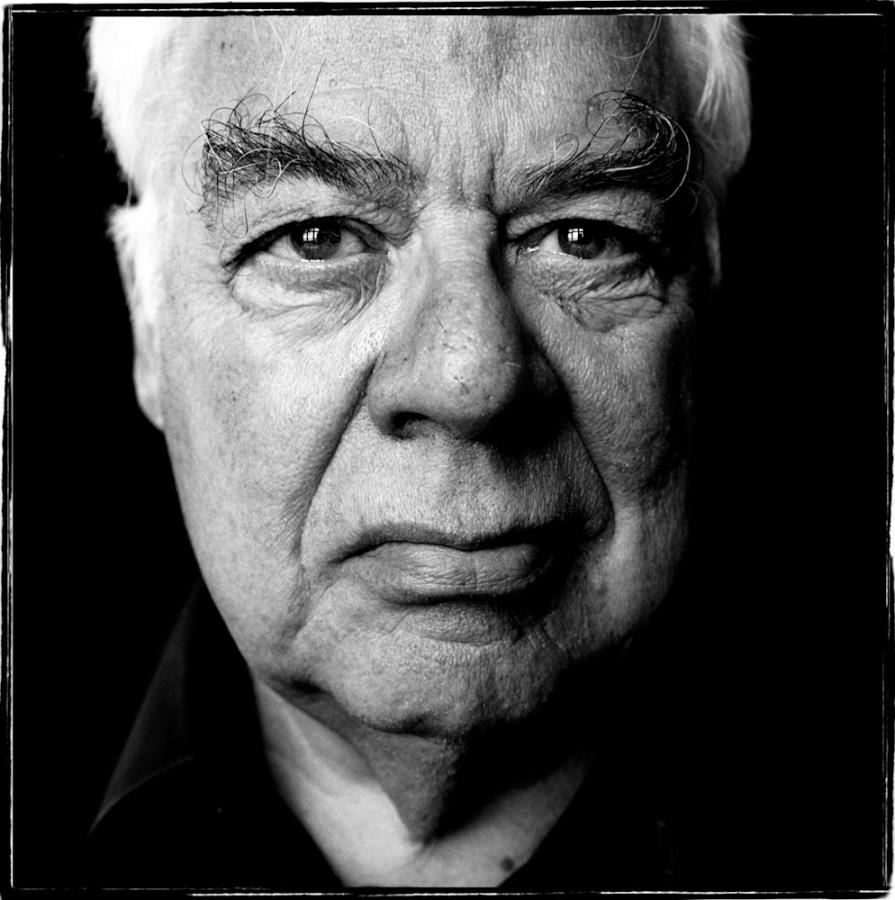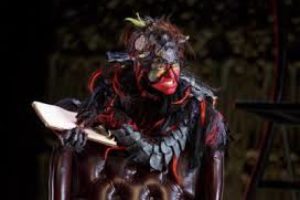Cigarette smoke drifts over the surface of the desk—the picture of [Pilate’s] wife when she still had her looks, the onyx box from Caesar, the clay plaque with the imprint of his first son’s hand on it, made while he was still a child in nursery school. Pilate squints at the man through the smoke and asks his question.
He asks it half because he would give as much as even his life to hear the answer and half because he believes there is no answer and would give a good deal to hear that too because it would mean just one thing less to have to worry about. He says, “What is truth?” and by way of an answer, the man with the split lip doesn’t say a blessed thing. Or else his not saying anything, that is the blessed thing. You could hear a pin drop in the big high ceilinged room with Tiberius grinning down from the wall like a pumpkin, that one cigarette a little unsteady between the procurator’s yellowed fingertips… (Buechner, 13-14)
In his book, Contingency, Irony and Solidarity, philosopher Richard Rorty makes the argument that, “To say that truth is not out there is simply to say that where there are not sentences there is no truth, that sentences are elements of human languages, and that human languages are human creations.” (Rorty, 5) This line of reasoning then leads him to conclude that, “the suggestion that truth, as well as the world, is out there is a legacy of an age in which the world was seen as the creation of a being who had a language of his own.” (Rorty, 5) What Rorty is arguing for here is that whatever it is we call truth, in common conversation, would not exist were it not for human language. truth’s (sic) dependence on human languages makes the truth an idea built out of something that is muddy, and convulted. What results of what Rorty is describing here is the end of an understanding of reality that is built on truth statements created out of human words. With this comes the end of a Christianity in which Christians need linguistically constructed creeds and statements of truth to validate their faith.
Rorty has an extremely valid observation when it comes to his analysis of human language and culture. As American Protestants, we must find a way to connect the Christian tradition to the idea that the concept that language is culturally contingent. I say must here because I believe that the contingency of language is as big of an ideological shift as Copernicus’ discovery that the earth rotated around the sun, an idea that sparked it’s own kind of religious controversy in his time.
And yet, the cultural contingency of language is not a new idea for Christianity, so to speak. In my opinion, the reason language’s contingency has been pushed to the margins Christian faith is because of the turn towards linguistic statements of truth that took place when Constantine the Great’s First Council of Nicaea constructed the Nicene Creed in 381 AD. In that event, a reliance on truth statements was fused into the religious experience of faith, making Christians think they had a way to access Truth tangibly through language.
Part of the reason the contingency of language has not been addressed for Christians in general is that for centuries Christian thinkers,
[have believed] that there are, out there in the word, real essences, which it is our duty to discover and which, are disposed to assist in their own discovery. They do not believe that anything can be made to look good or bad by being redescribed- or, if they do, they deplore this fact and cling to the idea that reality will help us resist such seductions.“ (Rorty, 5)
It is true there are both Christian and secular thinkers who would argue for ‘real essences’ in existence that are separate in nature from the world we exist in. This idea of there being an Essence of Truth (outside of the person of Jesus), specifically within the Christian tradition, seems to me to be a bitter tasting hold over from a Neo-Platonic, dualistic ontology that was long used to explain the ways in which the world around us functioned. It is one that has, in fact, been detrimental to a clear understanding of what exactly truth is, from a Judeo-Christian perspective.
The detrimental influence of Neo-Platonic ontology can be seen clearly in the confusion that has arisen in the two thousand years since the time of Christ over doctrines and dogmas in the Church (and subsequent churches). It is through these doctrines and dogmas that intellectuals and thinkers have, through the centuries, wrestled with words about God, faith and ultimately truth. Unfortunately, too few theologians acknowledge the fact that the doctrines and dogmas, while claiming to be systematic, are inevitably limited, since they are devised of human language. Doctrines are, as Jack Arthur Bonsor says, “analogical uses of language that are a constitutive element in finite spirit’s correspondence to the divine mystery.” (170) Bonsor’s use of the word analogical here means that we can never expect doctrines and creeds to ever be able to convey the entirety of the Truth of existence. In other words, the language of theology will never be able to fully convey Truth, in the way that some Christian thinkers would like it to. This means that the certainty in which you can speak about any issue, lessens significantly.
In his book entitled, Manifold Witness: The Plurality of Truth, John R. Franke addresses how many evangelical Christians have coped with the end of the age built on statements of Truth (signified for Franke here through the term postmodern):
It has become common for significant numbers of Christian thinkers to dismiss the concerns of postmodern thought as being incompatible with the faith…Christian thinkers are inclined to see postmodernism as nothing but warmed-over Nietzchean atheism, frequently on the short list of the most dangerous anti-Christian currents of thought…This view has been particularly influential among many conservative and evangelical Christian thinkers who generally assumed that postmodern thought is inherently opposed to the quest for truth, the idea of truth, and therefore to the particular truth claims of the Christian faith. (14-15)
I would argue that the reason postmodernity is so threatening is because many evangelical Protestant Christians are not able to hold the contingency of language in tension with their own claims of faith. This seems to have something to do with the way in which spiritual experience was fused with Neo-Platonic ideas. What this created was the fusion of the private (personal religious experience) to the public (abstract linguistic terms and definitions), creating an idea of Christianity in which one needed both in order to have a valid experience of God and faith. In the ‘language is contingent’ scenario only the private becomes the most important aspect of Christian faith.
And yet, this evangelical Christian assumption does not seem to be necessarily true upon further examination. Franke goes on to point out that,
just because human knowledge and perceptions of truth are always formed in the midst of particular situations does not mean that ultimate truth does not exist. Radical cultural relativism arises not from the interpretive and situated character of all human thought but rather from the assumption that there is no comprehensive [human] knower whose knowledge is [Truth]…[The atheist believes that] if our [human] thinking never merits the triumphalist title of Truth, and there is no other knower whose knowledge is the Truth, then the truth is that there is no Truth. But if the first premise is combined with a theistic premise, the result will be: The truth is that there is Truth, but not for [humans], only for God. (15)
In other words, the contingency of language does not have to be a threatening concept for those who claim to have personal experience of Christ. While the Christian may not be able to make a strong claim on Truth, there is still a higher being that can and does have access to that Truth (and is that Truth).
At this point, your question might be this: If a theology built out of contingent languages can only present truth in a analogical way (at best), as opposed to a way that can tangibly accesses Truth, wouldn’t this mean that these dogmas and doctrines are in fact, as Rorty claimed, human fabrications built out the languages used to write the doctrines and dogmas in the first place?
Jesuit theologian Karl Rahner addresses this issue of dogma and its historical contingency in Vol. 5 of his Theological Investigations:
The reality referred to by theological statements is one of incalculable richness and infinite fullness. The terminological material available for characterizing this reality is extremely limited… [This] historically conditioned, limited terminology lends historical finiteness, concreteness and contingence to the statement of faith itself, particularly in its theological form….For theology cannot take its departure, like geometry, from a finite number of axioms which can be strictly defined in concepts used by them (quite apart from the fact that even these sciences are not absolutely successful in this)…Of course those who teach and define are not always conscious of [the limited nature of terminology] and cannot even be conscious of it in a adequately reflective way. (Rahner, 54-55)
Rahner is asking us to move beyond “terminology” and definitions in describing reality. For Rahner, the contingency of the language used to describe reality does not necessarily mean there is no ultimate reality out there; rather, the reality is of so much “richness” and “fullness” that these limited post-Babel language systems are not equipped to fully describe what it is they are seeing and experiencing in the world. This then leads us to a series of crucial questions: First, what if Truth were something different from a definition or explanation made with language? What then would be the implications of an understanding of Truth as a way of being-in-the-world as opposed to a set of beliefs one has to declare allegiance too?
Works Cited
Buechner, Frederick. Telling the Truth. New York: HarperOne, 2009. Print.
Bonsor, Jack Arthur. Rahner, Heidegger, and Truth: Karl Rahner’s Notion of Christian Truth, the Influence of Heidegger. Lanham, MD: University of America, 1987. Print.
Franke, John R. Manifold Witness: The Plurality of Truth. Nashville: Abingdon, 2009. Print.
Rorty, Richard. Contingency, Irony and Solidarity. New York: Cambridge UP, 1989. Print.





6 Comments
Leave your reply.